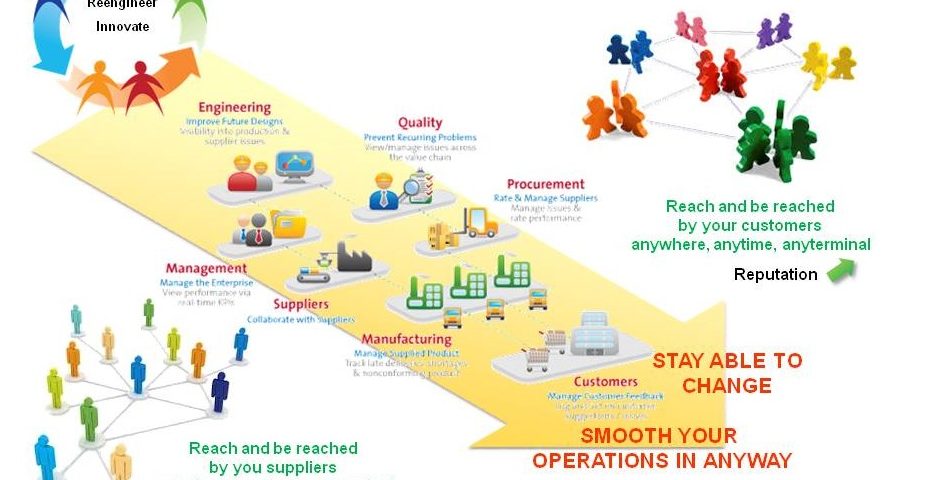 There are many talks about re-industrialization of France discussing on industrial production and services, as there is great hope based on multiplication of plants expected to increase employment and thereby, providing an answer to the question of unemployment. However, it has long been known that industrial production and services are atoms of the same molecule, they are inseparable. Could you imagine one second a car without credit services without updated board computer, without pre-sales services, sales, after-sales services?
There are many talks about re-industrialization of France discussing on industrial production and services, as there is great hope based on multiplication of plants expected to increase employment and thereby, providing an answer to the question of unemployment. However, it has long been known that industrial production and services are atoms of the same molecule, they are inseparable. Could you imagine one second a car without credit services without updated board computer, without pre-sales services, sales, after-sales services?
Clients show primarily interested in the uses they are doing of products, or those that accrue to their own customers, uses, agreeing in the broadest sense, include aspects emotional and aesthetic benefits. For example, energy companies through the acquisition of a nuclear plant are primarily concerned with the best combination of products and services that will ensure continuous production of energy, as well, airlines do not size up technology aircraft, but the combination of products and services that offers the most hours of flight. All whish suppliers basing their commitments on that. It is the ignorance of this logic that led to the failure of Concorde tough it was a technological feat.
Traditionally, the industry is the sector where expected gains in productivity are the most important, because automation of operations can be carried very far. It is not uncommon for factories or power plants to be driven by a few people. It has long been recognized that the sources of employment are mostly in services that require more operations to be carried out by people.
If the question is for governments to define policies that lead to a balanced national economy providing employment to all and equitably distributing wealth for the entrepreneur, it is primarily a strategic issue of controlling supply chain and distribution. To achieve these goals, the only direction it worths to follow, both for SMEs and companies in the CAC40 table, is that of the digital enterprise.
It was found that production chains are complex phases of design and production are intertwined, mobilizing more and more players. Goods and services are in continuous redesign for integrating a growing number into a single product, and require that skills increasingly diverse. We are told that this would pursue one goal: customer satisfaction. We might easily believe it because the industrial development of the last 20 years has tended to produce a range of increasingly personalized. This is without taking into account the imperfection of markets and the ability of the Marketing Directors who have limited competition. The customer is still far from being knighted in ideal path to kingship.
In this relatively stable, companies have focused on the concept of channel through which they developed with great sophistication and their ability to interact with the client, priority massify their customer relationships while controlling costs. Today, this approach is rigid with respect to the unpredictability of new uses and new types of interactions apparition that provide opportunities for market entry for new competitors.
Most of them are digitizing from the point of view of infrastructure, software, broadband networks or data centers. However, Digitize business is not just the companies to be connected to broadband connections, even if it contributes greatly. The main objective is to significantly increase the use of information technology to create, design and produce molecules of goods and services tailored to customer use or ability to bind within macromolecules in construction with industrial partners.
 And this concerns both SMEs and large industries. For example, producers of nuclear reactors should mourn their pride in their beautiful technology. Reactors should not be produced for what they are but for their ability to fit into a device that ensures customers get the use they expect. This is true not only for other large manufacturers or industry, but also for SMEs. This change seems to be difficult to achieve for all, it shows that the Concorde syndrome has not completely disappeared from France.
And this concerns both SMEs and large industries. For example, producers of nuclear reactors should mourn their pride in their beautiful technology. Reactors should not be produced for what they are but for their ability to fit into a device that ensures customers get the use they expect. This is true not only for other large manufacturers or industry, but also for SMEs. This change seems to be difficult to achieve for all, it shows that the Concorde syndrome has not completely disappeared from France.
Yet it is urgent, because technologies are spreading. Despite all the customers buy the boaster leading suppliers so that not belie the old observation of Solow about their non-existent impact on economic statistics, such as growth rate of economy currently so important. New champions appear on horizon that threatens to upset many of our national industries.
How to act while business leaders have invested heavily and continue to invest in technology, while the service sector around information technology is growing, as we have very good engineers?
Today the key points of the transformation are the approaches, methods, mindset, labor relations. The ball is in the camp of entrepreneurs and the game is difficult because to be successful, it must meet all of the ingredients, should you miss one and you will not get the result. What is the value of a car door without the rest? Yet it is not uncommon to find commercial people trying to make us believe it …
Business leaders must rebuild their approach to the relationship between products and customers, facilitating designs and redesigns of the mix of goods and services to achieve what really matters to customers, adapt the supply chain as a result, managing a network of partners and researchers to propose innovations that will anchor the client company, the customer link more closely the processes of research, design and innovation. This requires a radical transformation of the business of the Marketing function, through the production, sales, research and services. She then bénéfiera all information technologies that flow from cloud computing.
The same question arises with respect to company employees, contractors or subcontractors. Settlements companies sometimes fall into the world, some employees are travelling all the time, others work mainly at home. The links between them are becoming looser and collaborations take place sporadically. It is essential to rethink the approach to relationship between a company and its employees, taking into account their contributions, their tasks, but also how to keep them involved in the company to facilitate episodes of collaboration.
Alongside business leaders, helping them to lead this complex and difficult transformation, new skills must grow like Digital Enterprise Designer who knows dependances between culture, work approaches, state of mind, practices and technologies in the current business context, and who knows how to propose adapted scenarios of transformation. The current business needs a Designer as a modern tower needs an architect.
This transformation must be an overall movement, national or sector job, to get results on a large scale, because we are in an economy of cooperation. Some companies may influence their partners and start the transformation, others will have the chance to enjoy their own movement.
France has many advantages, it can still turn round. It is a question of willingness of everyone involved, the state, leading companies in business sectors, business leaders themselves. It is not the time to deploy infrastructure, but to change our approaches, our methods, our behavior, our thoughts, our ways of seeing. To succeed, we need to build on new skills and develop those Designer Digital Enterprise.

